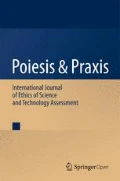Abstract
Interactive technology assessment is a novel approach to evaluating (health) technology, which philosophically draws from the works of Rawls and Habermas. That is, it seeks to organise a practical setting for discursive ethics in order to find a legitimate basis for policy to be pursued when the technology under scrutiny features a moral controversy. Interactive technology assessment involves a cycle of interviews with all stakeholders, who are explicitly asked to respond (anonymously) to the concerns and issues raised by other participants. This cycle is completed repeatedly, so that a process of vicarious learning develops. This process aims at identifying issues agreed and disagreed upon, on the basis of which widely endorsed policy recommendations can be formulated. This chapter involves an interactive technology assessment of paediatric cochlear implantation. The rationale, the design, and the results are explained, as well as the main ethical aspects of the procedure.
Zusammenfassung
Interactive technology assessment (interaktive Technologiefolgenabschätzung) ist ein neuer Ansatz zur Bewertung von (Medizin-)Technologie, der in philosophischer Hinsicht auf Arbeiten von Rawls und Habermas zurückgreift, das heißt, sie versucht eine praktische Situation für diskursive Ethik zu organisieren, um eine legitime Grundlage für eine Politik zu finden, die zu verfolgen ist, wenn die betreffende Technologie durch eine moralische Kontroverse gekennzeichnet ist. Zur interaktiven Technologiefolgenabschätzung gehört ein Zyklus von Befragungen aller Interessengruppen, die explizit gebeten werden, sich zu den Bedenken und Fragen anderer Teilnehmer (anonym) zu äußern. Dieser Zyklus wird mehrmals wiederholt, sodass sich ein Prozess mittelbaren Lernens entwickelt. Dieser Prozess hat das Ziel, Punkte zu identifizieren, in denen Übereinstimmung herrscht, und Punkte, über die die Teilnehmer sich nicht einigen können. Auf dieser Basis können dann allgemein gebilligte Politikempfehlungen formuliert werden. Dieses Kapitel befasst sich zum Beispiel mit der interaktiven Bewertung der Technologie der Cochlea-Implantation in Kindern. Es erklärt die Begründung, den Entwurf und die Ergebnisse der Prozedur sowie ihre wichtigsten ethischen Aspekte.
Résumé
L’évaluation technologique interactive est une nouvelle approche pour évaluer les technologies (médicales), qui tire son origine des travaux de Rawls et Habermas. Cela signifie qu’elle tente de d’organiser une configuration pratique pour l’éthique discursive, afin de trouver une base légitime aux politiques à suivre lorsque la technologie examinée fait l’objet d’une controverse morale. L’évaluation technologique interactive implique un cycle de sondages auprès de tous les groupes concernés, auxquels il est explicitement demandé de s’exprimer (anonymement) sur les préoccupations et les questions soulevées par d’autres participants. Ce cycle est répété à plusieurs reprises, de sorte qu’un processus d’apprentissage indirect se développe. Cette démarche vise à identifier les points suscitant l’accord ou le désaccord, sur la base desquels des recommandations politiques approuvées par une large majorité peuvent être formulées. Ce chapitre porte sur l’évaluation technologique interactive dans le cas des implants cochléaires en pédiatrie. Il présente le raisonnement, la conception et les résultats de la démarche de même que ses principaux aspects éthiques.
Similar content being viewed by others
Reference
Daniels N (1996) Justice and justification: reflective equilibrium in theory and practice. Cambridge University Press, p 22
Guba EG, Lincoln YS (1989) Fourth generation evaluation. Sage, Newbury Park, p 149
Habermas J (1983) Moralbewußtseins und kommunikatives Handeln. Suhrkamp, Frankfurt, p 104
Nielsen K (1983) Emancipatory social science and social critique. In: Callahan D, Jennings B (eds) Ethics, the social sciences, and policy analysis. Plenum Press, New York, p 134
Rawls J (1971) A theory of justice. Belknap Press, Cambridge
Reuzel RPB, Van der Wilt GJ (2000) Health technology assessment and evaluation: back to basics? Evaluation 6(4):383–398
Reuzel RPB (2001) Healh technology assessment and interactive evalution: different perspectives. Dissertation, University of Nijmegen
Scriven M (1980) The logic of evaluation. Edgepress, Inverness, CA
Author information
Authors and Affiliations
Corresponding author
Rights and permissions
About this article
Cite this article
Reuzel, R. Interactive technology assessment of paediatric cochlear implantation. Poiesis Prax 2, 119–137 (2004). https://doi.org/10.1007/s10202-003-0052-3
Published:
Issue Date:
DOI: https://doi.org/10.1007/s10202-003-0052-3




